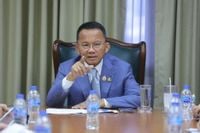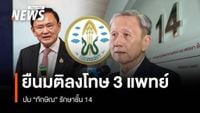On June 12, 2025, a significant and closely watched meeting of Thailand's Medical Council unfolded, centering on the controversial punishment of three doctors involved in the treatment of former Prime Minister Thaksin Shinawatra. The meeting, marked by intense scrutiny and public interest, saw the Council reaffirm its original disciplinary decisions despite a veto challenge from the Minister of Public Health, Mr. Somsak Thepsuthin.
Mr. Somsak, acting as a special member of the Medical Council, had exercised his authority under Section 24 of the Medical Profession Act B.E. 2525 to challenge the Council’s earlier resolution from May 8, 2025. That resolution had imposed various penalties on three doctors: Dr. Ruamthip Suphanant received a formal warning, while Pol. Lt. Gen. Sophonrat Singhcharu and Pol. Lt. Gen. Thaveesilp Wejchavitharn were both suspended from practicing medicine under Section 25 of the same act.
Before the June 12 meeting, Mr. Somsak had only 15 days to review the case after the Medical Council submitted the matter to him. Due to his limited legal expertise, he appointed a special committee to assist in reconsidering the punishments. He also repeatedly requested additional documents from the Medical Council, receiving some but not all, notably missing were materials from the ethics screening subcommittee. Relying on available documents and recorded proceedings, Mr. Somsak vetoed the Council’s initial disciplinary decisions, arguing that the doctors should not be punished.
In his remarks prior to the meeting, Mr. Somsak acknowledged the pressure he faced, including threats to remove him from his ministerial position and accusations suggesting he aimed to influence the Medical Council’s decision improperly. He firmly rejected these claims, emphasizing that his actions were grounded in law and fairness, aimed at protecting medical professionals from unjust penalties while maintaining appropriate disciplinary standards.
“The goal of my role is not to serve any individual but to protect and ensure fairness for medical professionals who face punishment,” Mr. Somsak stated. He also highlighted public distrust in the Medical Council, citing a NIDA Poll revealing that over 54% of respondents either lacked confidence or had little confidence in the Council’s operations. “Today’s work must restore public trust and uphold justice within the profession,” he urged.
Despite Mr. Somsak’s veto, the Medical Council proceeded with its deliberations. Dr. Prasit Watthanapha, Deputy Dean of the Medical Council and its first deputy president, addressed the media after the meeting, affirming that the Council had reaffirmed its original disciplinary resolutions with a strong majority vote—over two-thirds in favor, with more than 60 votes supporting each case.
Dr. Prasit explained that before voting, the Council members had received the veto letter and supporting documents from the special Medical Council two weeks prior. During the meeting, members compared this information against their original decision and conducted thorough analyses. “The process was transparent, clear, and based on academic principles and factual data,” he said.
One contentious issue during the proceedings was the emergence of leaked chat messages purportedly revealing informal opinions among Medical Council members. Dr. Prasit clarified that these chats did not originate from the official Medical Council group, as evidenced by the deletion of the group name and the involvement of individuals not on the Council. He noted that mentions of former Prime Minister Thaksin Shinawatra and casual “Yes” responses in these chats were not formal votes or opinions and had no bearing on the Council’s deliberations.
Addressing concerns about potential political interference or pressure, Dr. Prasit distinguished between genuine encouragement and coercion. He described support from over 50,000 signatories, including doctors from various institutions and generations, as positive reinforcement for the Council to uphold professional ethics and correctness. However, he acknowledged that some groups had attempted to pressure Council members to act contrary to their ethical standards, which he characterized as undue pressure or even intimidation.
Dr. Prasit expressed gratitude to the medical community and the public for their support in maintaining the integrity of the profession. He emphasized that the Medical Council’s role extends beyond patient care to preserving treatment standards and professional ethics. “This case will serve as a study for medical students, illustrating that a doctor's responsibilities include upholding the standards of care,” he said.
Looking ahead, the Medical Council planned to formalize its decisions by issuing official orders on June 13, 2025, notifying the doctors involved of their punishments. Dr. Prasit also noted that while the three doctors could challenge the Council’s decisions through the Administrative Court, the Council would stand ready to present its rationale. Furthermore, the Council indicated that it would consider disciplinary actions against other medical professionals linked to related cases.
The June 12 meeting, attended by 68 of 69 eligible Council members, marked the sixth session reviewing these ethics cases. The Council had convened ten times in total, with sessions lasting from one to six hours, reflecting the complexity and gravity of the matter. Throughout, the Council maintained that its decisions were guided strictly by professional and ethical standards, insulated from external influences such as political considerations or the identity of the patient.
This episode has shone a spotlight on the delicate balance between medical ethics, legal frameworks, and political pressures in Thailand’s healthcare governance. The Medical Council’s reaffirmation of its disciplinary actions, despite the Health Minister’s veto, underscores the institution’s resolve to act independently and uphold its standards, even amid controversy and public scrutiny.
As the Council moves forward with enforcement and potential further disciplinary measures, the case continues to resonate across Thailand’s medical and political landscapes—prompting reflection on how justice and fairness are administered within the medical profession.


